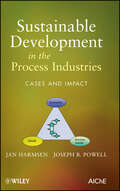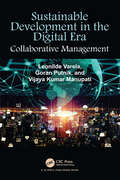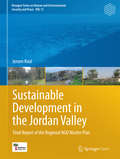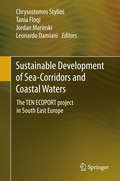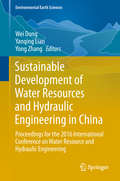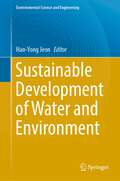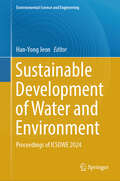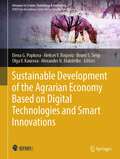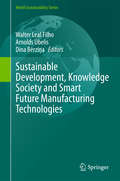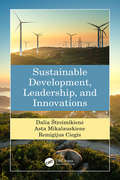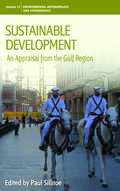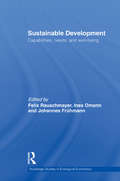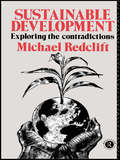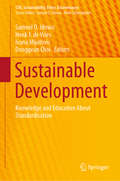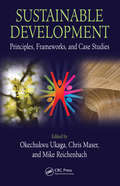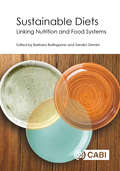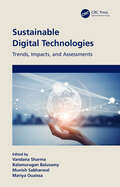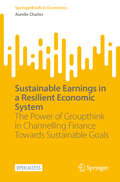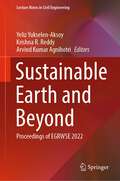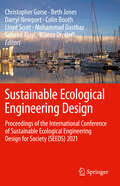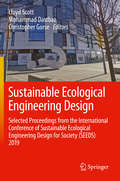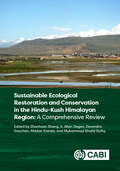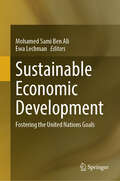- Table View
- List View
Sustainable Development in The Process Industries
by Jan Harmsen Joseph B. PowellBecause of the growing interest among petroleum, recycling, and other industries, sustainability is central to chemical engineers and students. Sustainable Development in the Process Industry not only explores but also demonstrates practical solutions for using sustainable technologies, focusing on three major points: people, prosperity, and planet. Rather than presenting theories, the text provides examples and cases studies ranging from the petroleum industry to the water processing industry. With a collection of international authors, the text is suitable for any chemical engineer or student interested in achieving a more sustainable world.
Sustainable Development in the Digital Era: Collaborative Management
by Leonilde Varela Goran Putnik Manupati Vijaya KumarCollaborative manufacturing and management are a fundamental requirement in today’s digital age, to enable an innovative and sustainable development of companies. This is possible and highly recommended not just in the context of traditional companies, but further in cyber physical systems and in the context of extended, distributed, networked and virtual organizations.The book provides fundamental methodologies, models, methods, tools, and platforms about collaborative engineering, to support manufacturing and management processes and practices, aligned with the current requirements underlying Industry 4.0, and Society 5.0. It describes the application of collaborative management paradigms, about dynamic, distributed, integrated, intelligent, predictive, parallel, and real-time based approaches and tools to enable collaborating entities, including suppliers, business partners and other stakeholders, to develop projects and solve problems that are becoming increasingly more complex and challenging currently. Such collaborative processes and practices require companies and underlying stakeholders to be connected, and to further communicate, and share data, problems, and expertise, and other kind of resources, along with concerns, difficulties, and challenges, requiring co-learning, and the co-creation of knowledge, processes, methods, and systems to interactively support projects and problem solving.The book reviews the advances and provides case studies to assist scientists, practitioners and students in high standard manufacturing management processes and practices, to properly handle daily problems and challenges, with a special focus on the use of recent paradigms and tools to support manufacturing management decision making, through innovative methodologies and approaches for permitting researchers to learn, develop further work, and become advanced practitioners and promoters of collaborative management.
Sustainable Development in the Jordan Valley
by Jeroen KoolThis book summarizes the NGO Master Plan that provides a comprehensive program to rehabilitate the Lower Jordan River and its tributaries in Jordan, Israel and Palestine. It is a regional and civil society effort designed to promote the restoration of the valley's environmental and ecological values within a realistic financial and economic framework. The plan identifies 127 specific regional and national "interventions"(projects) until the year 2050, based on seven strategic planning objectives: pollution control, sustainable water management and river rehabilitation, sustainable agriculture, Jordan River basin governance, ecological rehabilitation, sustainable tourism and cultural heritage development, and urban and infrastructure development. The total investment value is 4. 58 billion USD, the plan ranks the interventions and identifies their feasibility in a short, medium and long term investment cycles considering the political environment.
Sustainable Development of Sea-Corridors and Coastal Waters
by Chrysostomos Stylios Tania Floqi Jordan Marinski Leonardo DamianiEdited in collaboration with TEN ECOPORT project, this volume contains the proceedings of the 1st International Conference on 'Sustainable Development of the Sea-corridors and Coastal Waters'. The book highlights the advances of environmental pollution management on ports and coastal zones. Particular attention is given to water quality, issues that concern the marine environment of sea corridors and coastal waters, especially in regions surrounding ports. In addition to these topics the chapters explore novel methodologies and technologies, IT solutions, data and instrumentation of monitoring water quality. The book is organized into five parts: assessment, monitoring, sustainable management system, port processes and historical ports. TEN ECOPORT (Transnational ENhancement of ECOPORT8 network) is a project co-financed by the South East Europe Transnational Cooperation Programme.
Sustainable Development of Water Resources and Hydraulic Engineering in China: Proceedings For The 2016 International Conference On Water Resource And Hydraulic Engineering (Environmental Earth Sciences Ser.)
by Yong Zhang Wei Dong Yanqing LianThis book presents the gatherings of the “2016 International Conference on Water Resource and Hydraulic Engineering,” which primarily focused on the sustainable development of water resources and the environment in both China and the United States. The respective papers cover a wide variety of research areas, including watershed hydrology; river hydraulics; groundwater hydrology; water resources management and sustainability development; water supply planning under climate change; water quality analysis and water pollution; sponge city development and urban watershed management; environment and sustainability; global connections between air and water; and irrigation and drainage issues for agricultural engineering. The contributions will be of interest to a global readership and highlight the emerging problems facing developing countries, as well as research and measures to successfully deal with them and promote a greener and more eco-friendly living environment.
Sustainable Development of Water and Environment (Environmental Science and Engineering)
by Han-Yong JeonThis book aims to offer new scientific concept in the field of water and environment. The main purpose of this book is to exchange some of the latest research findings and educational information on the water and environment in order to take important measures to protect water resources and the environment for future generations in accordance with the principles of sustainable development. The book welcomes all related research and review papers and hopes ICSDWE can positively impact our world and provide a better future for all, including the improvement to the quality of life.
Sustainable Development of Water and Environment: Proceedings of ICSDWE 2024 (Environmental Science and Engineering)
by Han-Yong JeonThis book aims to introduce pioneering scientific concepts in water and environmental studies, fostering the exchange of cutting-edge research findings and educational insights. With a focus on sustainable practices in water resource management, quality, and pollution control, the ICSDWE conference addresses the vital linkages between environmental sustainability, climate change, and water-related issues. This year’s conference will focus on key themes such as climate change and water security, microplastics in freshwater ecosystems, sustainable groundwater development, transboundary water conflicts and cooperation, and environmental impact of desalination. By advocating for significant measures aligned with sustainable development principles, ICSDWE strives to safeguard water resources and the environment for future generations. We extend a warm welcome to all related research contributions, aspiring for ICSDWE to positively impact our world and enhance overall quality of life. This year, the ICSDWE conference will have its 7th edition. Through its previous editions, the conference has also contributed to the academic and practical discourse by publishing proceedings, policy briefs, and recommendations that serve as resources for researchers, practitioners, and policymakers alike. With each edition, the conference has reinforced its commitment to advancing sustainable development goals and addressing the most pressing environmental challenges of our time. Overall, the conference has established itself as a significant event for sharing knowledge, fostering partnerships, and promoting sustainable practices.
Sustainable Development of the Agrarian Economy Based on Digital Technologies and Smart Innovations (Advances in Science, Technology & Innovation)
by Elena G. Popkova Aleksei V. Bogoviz Bruno S. Sergi Olga V. Kaurova Alexander N. MaloletkoThis book elaborates on the modern experience and prospects and the development of recommendations for sustainable development of the agrarian economy based on digital technologies and smart innovations for the provision of food security. This book dwells on the global and regional challenges for food security and answers to them through the sustainable development of the agrarian economy. The book also studies the international experience of sustainable development of the agrarian economy on the basis of digital technologies and advantages for food security. Sustainable development of the agrarian economy with the use of digital technologies—as the foundation of food security of Central Asia—is considered. The prospects for provision of food security through the use of smart innovations for the sustainable development of the agrarian economy are outlined. A set of applied recommendations for raising the effectiveness of the use of smart innovations for the sustainable development of the agrarian economy is proposed.
Sustainable Development, International Criminal Justice, and Treaty Implementation
by Marie-Claire Cordonier Segger Sébastien JodoinInternational Criminal Justice and Sustainable Development provides a serious and timely perspective on the relationship between two important and dynamic fields of international law. Comprised of chapters written by leading academics and international lawyers, this book examines how the principles and practices of international criminal law and sustainable development can contribute to one another's elaboration, interpretation, and implementation. Chapters in the book discuss the potential and limitations of international criminalization as a means for protecting the basic foundations of sustainable development; the role of existing international crimes in penalizing serious forms of economic, social, environmental, and cultural harm; the indirect linkages that have developed between sustainable development and various mechanisms of criminal accountability and redress; and innovative proposals to broaden the scope of international criminal justice. With its rigorous and innovative arguments, this book forms a unique and urgent contribution to current debates on the future of global justice and sustainability.
Sustainable Development, Knowledge Society and Smart Future Manufacturing Technologies
by Walter Leal Filho Arnolds Úbelis Dina BērziņaThe book contributes to a better understanding of the role of knowledge societies in achieving sustainability. It is based on the conference with the same title held in Riga, which brought together experts from Europe and the rest of the world. The book highlights sustainable development in relation to the knowledge society and smart future manufacturing technologies, and it helps provide a better understanding of the interplay between sustainable development and knowledge society issues, and how these could lead to a better future.
Sustainable Development, Leadership, and Innovations
by Dalia Streimikiene Asta Mikalauskiene Remigijus CiegisThis book deals with the main challenges of sustainable development and the role of sustainable business and corporate social responsibility in implementing these challenges through sustainable leadership and innovations. It includes the economic, social, and environmental dimensions of sustainability and emphasizes the importance of achieving a socio-environmental balance in society. The theoretical frameworks and insights from sustainable development implementations on macro and micro levels, as well as the practical examples and case studies provided to introduce the concept of sustainable leadership and its impact on sustainable business development, are a scientific novelty in the field of sustainability. The book is comprised of six interconnected chapters that sequentially reveal the principal provisions of sustainable development, corporate social responsibility, and sustainable leadership, together with their correlations. Features: • Provides cutting-edge examples and case studies of sustainable leadership, viewed as the most significant means for the creation of sustainable organizational culture • Includes case studies on the economic, social, and environmental dimensions of sustainability • Addresses scientific aspects of sustainable development and its challenges • Discusses issues of sustainable development at different scales, ranging from macro to mirco levels • Provides policy implications for sustainable business development The theoretical framework and practical case studies presented in Sustainable Development, Leadership, and Innovations make it an invaluable resource and guide to both the academic and business communities. Business leaders, policy makers, and other professionals, as well as academics and graduate students, will all benefit greatly from this text.
Sustainable Development: An Appraisal from the Gulf Region
by Paul SillitoeWith growing evidence of unsustainable use of the world's resources, such as hydrocarbon reserves, and related environmental pollution, as in alarming climate change predictions, sustainable development is arguably the prominent issue of the 21st century. This volume gives a wide ranging introduction focusing on the arid Gulf region, where the challenges of sustainable development are starkly evident. The Gulf relies on non-renewable oil and gas exports to supply the world's insatiable CO2 emitting energy demands, and has built unsustainable conurbations with water supplies dependent on energy hungry desalination plants and deep aquifers pumped beyond natural replenishment rates. Sustainable Development has an interdisciplinary focus, bringing together university faculty and government personnel from the Gulf, Europe, and North America -- including social and natural scientists, environmentalists and economists, architects and planners -- to discuss topics such as sustainable natural resource use and urbanization, industrial and technological development, economy and politics, history and geography.
Sustainable Development: Capabilities, Needs, and Well-being (Routledge Studies in Ecological Economics #9)
by Felix Rauschmayer Ines Omann Johannes FrühmannThis groundbreaking new work establishes links between sustainable development, needs, well-being, and the capabilities approach that is central to human development and the United Nations Development Programme. By challenging the role of people in sustainability policy, this collection’s argument refocuses sustainable development on needs and makes it easier for people to relate positively to its core values. This exciting new book incites a whole new way of looking at sustainable development. Even though the word ‘needs’ is central to the most popular definition of sustainable development, the concepts of needs and capabilities remain within the debate on human development, without going further into intergenerational justice or environmental protection. The discussion of needs reaches non-academics in a more direct way than talking about abstract thresholds, substitutability and other issues dear to academic debate on sustainability. This collection links the questions of intra- and intergenerational justice with issues of quality of life, life courses, and well-being. Dealing with needs entails dealing with deeper layers of consciousness, revealing emotions and questioning habits and values. In this way, the collection presents an opportunity for substantial social change as well as a challenge for research and policy-making. This thought-provoking collection asks its readers to reconsider the role of needs based on the philosophical arguments presented, to understand how sustainability can become a part of the capability approach, to better consider the dependency of life chances on birth contingencies, and to see the relationship between capabilities, needs, and well-being in a different light. The editors finish by clarifying the possibilities and challenges of a needs-based sustainability policy for policy makers, and explain the role of deeply held values. This book should be of interest to postgraduates and researchers in Environmental and Ecological Economics, as well as many other disciplines including Political Economics, Social Ecology, Human Ecology, Sustainability Science and Developmental Politics.
Sustainable Development: Exploring the Contradictions (Sustainable Development Set Ser.)
by Michael RedcliftArgues that environmental problems need to be looked at internationally, in terms of the global economic system, and that the degradation of the environment is not natural', but an historical process which is intrinsically linked and shaped by economic and political systems.
Sustainable Development: Knowledge and Education About Standardisation (CSR, Sustainability, Ethics & Governance)
by Samuel O. Idowu Henk J. de Vries Ivana Mijatovic Donggeun ChoiThis book examines education about standardization in the context of sustainable management. It shows the role of standardization education in the global economy, and in markets, industries and businesses. The book presents knowledge on standardization for sustainable management, describes measures that can be taken to stimulate it, and highlights strategies for teaching and disseminating the concept. Subsequently presenting a number of best practices and case studies, the book seeks to align theory and practice. For researchers, this is the first academic publication that interconnects the concepts of sustainability, standardization and education. For professionals in the area of sustainability it shows that standardization is an essential instrument for enhancing sustainability for which proper education is needed. For standardization professionals the book reveals the links to sustainability and it shows not only the importance of education about standardization but also how this can be organized, and finally, for universities, the book shows that standardization deserves to be included in the curriculum, and it provides guidance and best practice examples about how this can be done.
Sustainable Development: Principles, Frameworks, and Case Studies
by Chris Maser Okechukwu Ukaga Mike ReichenbachCoined in the 1970s, the term sustainable development and the ideas behind it have enjoyed varying amounts of popularity over the years. And while dire predictions abound, the full impacts of global warming are not known, nor can they be known. What we do know is that to be sustainable, all societies must adjust to new realities, which include chan
Sustainable Diets: Directions And Solutions For Policy, Research And Action
by Barbara Burlingame Sandro DerniniThis book takes a transdisciplinary approach and considers multisectoral actions, integrating health, agriculture and environmental issues to comprehensively explore the topic of sustainable diets. The team of international authors informs readers with arguments, challenges, perspectives, policies, actions and solutions on global topics that must be properly understood in order to be effectively addressed. They position issues of sustainable diets as central to the Earth's future. Presenting the latest findings, they: <P><P> - Explore the transition to sustainable diets within the context of sustainable food systems, addressing the right to food, and linking food security and nutrition to sustainability; <P><P> - Convey the urgency of coordinated action, and consider how to engage multiple sectors in dialogue and joint research to tackle the pressing problems that have taken us to the edge, and beyond, of the planet's limits to growth; <P><P> - Review tools, methods and indicators for assessing sustainable diets; <P><P> - Describe lessons learned from case studies on both traditional food systems and current dietary challenges. <P><P> As an affiliated project of the 10YFP Sustainable Food Systems Program, this book provides a way forward for achieving global and local targets, including the Sustainable Development Goals and the United Nations Decade of Action on Nutrition commitments. This resource is essential reading for scientists, practitioners and students in the fields of nutrition science, food science, environmental science, agricultural science, development studies, food studies, public health and food policy.
Sustainable Digital Technologies: Trends, Impacts, and Assessments
by Vandana Sharma, Balamurugan Balusamy, Munish Sabharwal, and Mariya OuaissaThis book is a reference on digital technology and its impact on sustainability, providing insight into sustainable practices globally. It focuses on the critical practices leading to sustainable initiatives among various organizations, IT infrastructure, communities, and government compliance. The book describes the green computing paradigms and the impact of a circular economy with a focus on sustainable practices in a post-pandemic world. Sustainable Digital Technologies: Trends, Impacts, and Assessments discusses the critical factors leading to sustainable initiatives in a global economy. It highlights the impact of digital technology and Industry 4.0 in today’s world. The book focuses on the role, responsibility, and the effect of the Internet of Things for digital sustainability and practices. It describes implementation strategies for green cloud computing and presents additional strategies for sustainable practices in a post-pandemic world. This publication is designed for use by technology development academicians, data scientists, industrial professionals, researchers, and students interested in uncovering the latest innovations in the field and the current research on problem-oriented processing techniques in sustainable and evolutionary computing applications with reduced energy channelization.
Sustainable Earnings in a Resilient Economic System: The Power of Groupthink in Channelling Finance Towards Sustainable Goals (SpringerBriefs in Economics)
by Aurelie CharlesIn a world where global finance must align with the green transition, this Open Access book challenges established economic thinking. It argues for a shift from individualism to group-focused economic theory and policy, revealing that historical financial accumulation stemmed from collective rather than individual actions. To combat detrimental herd behavior, the book advocates for methodological groupism in economic policies. This shift promises more resilient financial flows, ensuring widespread societal benefits and mitigating harm to the global ecosystem. Through data analysis of capital and labor earnings in the US, UK, France, and Italy, and the introduction of "sustainable earnings trends," the book provides actionable insights applicable from local to international levels, using the Sustainable Development Goals (SDGs) as a guiding framework. This makes the book a must-read for scholars, researchers, and students of environmental economics, sustainability, labor economics, finance, public policy, and governance, as well as policymakers seeking profound insights into the future of sustainable economics and finance.
Sustainable Earth and Beyond: Proceedings of EGRWSE 2022 (Lecture Notes in Civil Engineering #370)
by Krishna R. Reddy Arvind Kumar Agnihotri Yeliz Yukselen-AksoyThis book presents select proceedings of the Third International Conference on Environmental Geotechnology, Recycled Waste Materials and Sustainable Engineering (EGRWSE-2022). It covers state-of-the-art research on environmental geotechnology, sustainability, and use of recycled waste materials for civil infrastructure along with latest accomplishments, trends, concerns, innovations, practical challenges encountered, and the solutions adopted in this field. Given the contents, this book is useful for researchers, engineers, and professionals working in the areas of geoenvironmental engineering, waste management, and sustainable engineering and associated fields.
Sustainable Ecological Engineering Design: Proceedings of the International Conference of Sustainable Ecological Engineering Design for Society (SEEDS) 2021
by Beth Jones Mohammad Dastbaz Christopher Gorse Colin Booth Lloyd Scott Darryl Newport Saheed Ajayi Bianca DrotleffThe International Conference of Sustainable Ecological Engineering Design for Society (SEEDS) brings together global experts to focus on a sustainability agenda and the positive and detrimental changes that are taking place. Papers presented at the conference come from across a broad spectrum of the Sustainable Development Goals (SDGs) and bring forward practices to tackle the climate emergency and evaluate their impact. It addresses technical issues, measuring, monitoring, and assessing change, emphasizing the environment, infrastructure, and buildings, how they exist in relative isolation, and the possibilities for sustainable integration. The SEEDS Conference addresses the interdependence of people and the built and natural environments and recognizes the interdisciplinary and international themes necessary to assemble the knowledge required for positive change.
Sustainable Ecological Engineering Design: Selected Proceedings from the International Conference of Sustainable Ecological Engineering Design for Society (SEEDS) 2019
by Mohammad Dastbaz Christopher Gorse Lloyd ScottThrough research and proven practice, the aim of the International Conference of Sustainable Ecological Engineering Design for Society (SEEDS) is to foster ideas on how to reduce negative impacts on the environment while providing for the health and well-being of society. The professions and fields of research required to ensure buildings meet user demands and provide healthy enclosures are many and diverse. The SEEDS conference addresses the interdependence of people, the built and natural environments, and recognizes the interdisciplinary and international themes necessary to assemble the knowledge required for positive change.
Sustainable Ecological Restoration and Conservation in the Hindu Kush Himalayan Region: A Comprehensive Review
by Professor Zhanhuan Shang Professor Allan Degen Dr Devendra Gauchan Professor Madan Koirala Dr Muhammad Khalid RafiqThe years 2021 to 2030 have been designated as "The United Nations Decade on Ecosystem Restoration". Ecological restoration and biodiversity conservation efforts face unprecedented challenges, especially in developing countries and areas, such as the Hindu Kush-Himalayan (HKH) region. This huge HKH region, which includes areas in eight separate countries (Afghanistan, Pakistan, Nepal, India, China, Bangladesh, Myanmar and Bhutan), is a biodiversity hotspot with a vast array of ecosystems, landscapes, peoples and cultures. It is known as one of 'the pulses of the world'. However, the HKH is also the world's largest and poorest mountain region, where landscapes and environments have been severely damaged as a result of climate change and human activities. Coordinating conservation and restoration policies, sharing knowledge and funds, and maintaining livelihoods are major challenges and are in urgent need of improvement. This book details the past and current ecological problems in the HKH region, and the threats and challenges that ecosystems and local people face. It pays special attention to developments of transformative adaptations and presents examples of sustainable conservation and ecological restoration management practices. Three primary questions are addressed: (1) Do the existing conservation strategies of international organizations and government policies really protect ecosystems and solve biodiversity problems? (2) Can these management measures be one-time solutions? and (3) What is the strategic framework and scenario prognosis for the future based on the historical trajectory of ecological conservation and restoration in the region? This book is essential reading for ecologists and conservation biologists involved in large-scale ecological restoration projects, along with practitioners, graduate students, policy makers and international development workers.
Sustainable Economic Development: Fostering the United Nations Goals
by Ewa Lechman Mohamed Sami Ben AliThis book provides readers with a comprehensive understanding of the general framework of sustainable development paths in relation to where countries stand at present, by outlining the main challenges they face, and the potential pathways ahead to foster the Sustainable Development Goals (SDGs). In connecting different SDG’s, the collection of chapters teases out the multifarious relationships and influences on policy, balancing economic, social, and environmental dimensions for development, making qualitative distinctions between high-income and low-income countries in the SDGs context. In doing so, the book emphasizes that with the rapid upliftment from extreme poverty and subsistence, globally, growing economic and social gaps have expanded with unprecedented speed. Widening divides in material wealth are shown, to some extent, as a ‘side effect’ of fast economic growth and development. This book draws out these connections between economic progress (expressed through shifts on per capita income) and the achievements and setbacks, to meeting each of the SDGs, respectively. Beyond its place in social scientific discourse, relevant to scholars researching the various aspects of sustainable economic development, this book's findings also have important implications for policymakers, development specialists, and economists in both developed and developing countries.
Sustainable Economic Development: Utilizing Non-Financial Performance, Sustainability Reporting, and Corporate Governance
by Mirela Panait Lukman Raimi Iza GigauriThis book provides an interdisciplinary look at how non-financial performance, sustainability reports, and corporate governance can be used as tools to facilitate sustainable economic development. It examines emerging trends within corporate social responsibility to offer ways in which supply chain management, customers, and different stakeholders, both within development and emerging economics, can support both social and economic development. Ways in which company digitization can support the broaden digital transformation of global economies, how greenwashing can be overcome, and the empowering of gender and cultural diversity within corporate structures and broader society are also discussed. This book highlights how industry and corporate governance can contribute to the sustainable economic development agenda and be included in the structural transformation underpinning the green transition. It will be relevant to students and researchers interested in environmental economics and corporate responsibility.
